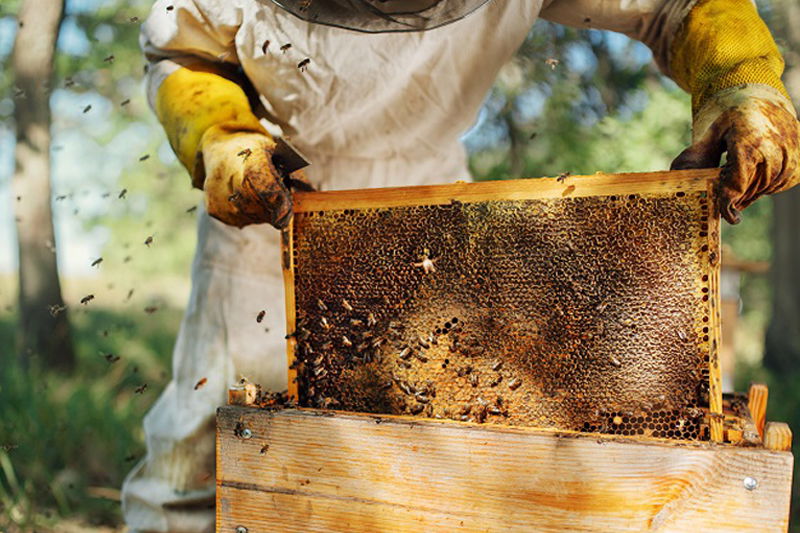Have you ever heard that honey could help naturally reduce the effect of allergies? Do you know why it may help, or are you wondering if it is true? Here is more information about honey and allergies.
What is honey?
Honey is a thick, sweet, golden substance produced by bees. Bees make honey by collecting pollen and nectar from flowers. In the hive, the bees store the honey in a honeycomb. The bees fan the honey to evaporate the water and then seal it with a liquid that turns into beeswax when it hardens.
There is a common belief that eating honey—particularly local honey—can help lessen the symptoms of seasonal allergies.
What are seasonal allergies?
Seasonal allergies (or seasonal allergic rhinitis) are commonly referred to as hay fever. Seasonal allergies usually occur during the spring or fall. The allergic symptoms are caused by your body’s reaction to pollen from trees, grasses, and weeds.
Common symptoms of seasonal allergies include:
- Runny nose
- Stuffy nose
- Sneezing
- Watery eyes
- Itching of the eyes, nose, or roof of the mouth
Can honey help with seasonal allergies?
As mentioned above, many people believe that consuming local honey can help to lessen the symptoms of seasonal allergies. Unfortunately, this is not true.
The myth purports that eating local honey can help with allergies because it contains pollen from the same plants that cause allergies. However, bees do not collect pollen for honey from the trees, grasses, and weeds that usually cause seasonal allergies. Instead, bees typically eat nectar and collect pollen from brightly colored flowers. Therefore, the pollen that causes seasonal allergies is not the same pollen used to make honey.
In addition, as part of the process of making honey, the bees mix their food with enzymes to start digesting it. This changes the pollen protein, so even if the bees had collected pollen from the same plants that cause seasonal allergies, the pollen would no longer be intact. The pollen is further broken down or even removed during processing, pasteurization, and digestion by your own stomach’s enzymes. In the end, you do not ingest enough intact pollen from honey to begin to desensitize your immune system to the allergens. Furthermore, some experts believe that if you did consume pollen from eating honey, it would create allergic symptoms rather than lessen them.
How can you treat seasonal allergies?
While it might be bad news that honey doesn’t help with seasonal allergies, the good news is that there are effective ways to treat seasonal allergies. The most common treatments for seasonal allergies are allergy medications (over-the-counter or prescription) and immunotherapy. Allergy medications like antihistamines or nasal corticosteroid sprays can help you control your symptoms. It can also be helpful to avoid spending time outdoors on days with high pollen counts.
If allergy medications are not providing adequate relief from your seasonal allergies, you may benefit from immunotherapy. The goal of immunotherapy is to reduce your body’s reaction to allergens (like pollen) by exposing you to small amounts of the allergen over time. Your allergist will be able to determine whether immunotherapy is a good option for you.
To learn more about treatments for seasonal allergies, we welcome you to contact us today at West River ENT & Allergy.




